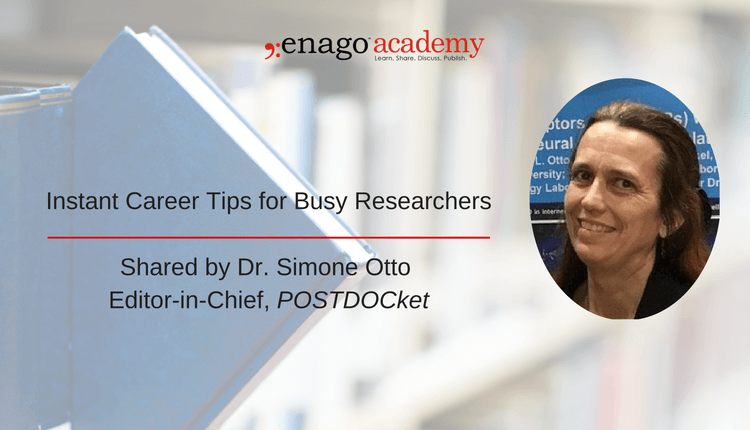Instant Career Tips for Busy Researchers

Simone Otto, PhD, is a neuroscientist who has always been fascinated by communication, learning, and memory. Before obtaining her degree, she had learned multiple languages, written a manuscript, and acted briefly as a translator. Her on-going research, as a postdoctoral scholar at NIEHS, focuses on hippocampal learning and memory. She has recently also become the Editor-in-chief for The POSTDOCket, the online monthly newsletter for the National Postdoctoral Association.
Enago Academy has asked Dr. Simone to share some of her views on the dos and don’ts of being a postdoc.
How important is it for scientists to become good storytellers? Does this help them in any way?
It is vital for scientists to become good storytellers. No matter how cool your discovery is, if you cannot tell the world about it, it becomes meaningless. It is important to share knowledge; in fact, free dissemination of knowledge is one of the cornerstones of science. This does not mean couching science behind jargon or inaccessible language.
Furthermore, there is some semantic confusion in scientific circles over the word “story-telling,” because some people confuse it with the words “lie” or “obfuscate,” which would clearly undermine science. However, science does not need to be dry and inaccessible to be factual. Telling a good story simply means being able to share the logical build of your findings, from hypothesis (the beginning), through data (the middle), to conclusions (the end).
Describing your science story correctly helps you be understood by everyone. This aids the individual scientist in getting grants and publishing papers. We need evidence-based scientific facts to be obvious and accessible to everyone. Scientists, therefore, must communicate their research clearly.
Science communication has become a discipline on its own. However, the gap still exists because of language barrier, especially among ESL authors. How do you think this could be overcome?
Overcoming a language barrier is a difficult problem for authors. To learn another language sufficiently well to tell stories in that language is extremely difficult. In part, this is because stories often contain imagery, allusion, humor, allegory, or metaphor, all of which may not have direct translations. Fortunately, there is an increasing number of resources available to ESL authors. It would be useful if all institutions provided additional science communication courses geared specifically towards ESL postdocs, to help them overcome language barriers specific to their background. Providing more informal opportunities to ESL scientists to improve their language skills by establishing a network of language mentors might also help overcome this gap.
What would be your top 5 recommendations to researchers who wish to communicate their research effectively to the general public?
My top 5 recommendations to researchers who wish to communicate their research with the general public would be:
- Tell the punchline first, in clear, concise language. This is called a “lede.” It is somehow unknown to many, although it is vital for scientific communication. Your audience should know what is important and why they should care.
- Avoid jargon but include imagery. You can use a metaphor, but it’s not necessary. Just, don’t be dry. Describe the juicy details of what you did and why you did it.
- Let your story have pauses. These spaces let your audience focus on the essential data and the science. Don’t overwhelm them with a clutter of tangential facts.
- Listen to your audience. Communication involves sharing a message, a passion, or an idea. Sharing necessitates two or more minds. Knowing your audience before you begin informs your beginning and how much you can accomplish in a given time.
- Communicating effectively only seems effortless after a great deal of practice. You can practice by writing for online newsletters or blogs. You can participate in contests at your institution (e.g., contests held by Falling Walls Lab or Three Minute Thesis). You can also take classes or workshops online or at your institution. Through practice, you will learn how best to frame your message to make it accessible to everyone.
How should PhDs make the most out of a postdoctoral opportunity?
The moment you accept a postdoc until you complete it, two things should concern you; how to leave and how to leave well.
Postdoctoral fellowships are temporary positions, giving the postdoc time to better position themselves to transition to the career of their choice. It is important in accepting a postdoc to have a career plan, and use your time as a postdoc to gain as much experience and as many contacts as possible in that new field. This may include taking classes to get further certifications, lecturing in a college classroom, completing an internship in industry, or gaining experience writing. Whatever your next move, focus on it, plan ahead, and gain experience.
However, you also need to leave well. Entering the postdoc means agreeing to conduct research that culminates in publications. Decide early on how much research this entails and start planning your publication on the first day so that you do not waste precious time doing unpublishable experiments, no matter how interesting they seem to be. If you do this, you end up completing your postdoctoral stint with a good reputation and with documentary evidence that you can complete projects you have agreed to.
Should all postdoctoral training programs have new mandatory requirements (e.g., training in people management and technical communication)?
There is no uniform consensus across the U.S. about whether a postdoctoral stint is a job or a training position, and this should probably become more uniform before any mandatory requirements can be instated. In my opinion, it is important for a postdoc to engage in training, certification programs, and other career development opportunities. As to exactly what those opportunities are, they should be reflective of the skills or training needed to transition into career opportunities available to the postdoc.
What are the most common mistakes that postdocs make?
The most common mistake a postdoc makes is assuming they need a postdoc. For many positions, having a postdoc is not needed. Before accepting a postdoctoral position, the individual should consider how it fits with his or her life goals.
The second mistake postdocs make is not aligning their postdoc with their interests. This means evaluating what the institution’s postdoctoral office offers and whether the lab will provide a cultural “fit” for the postdoc, as well as whether the research techniques or goals supported by the potential lab dovetails with the career goals of the postdoc.
Postdocs often do not plan their next career move soon enough. While many postdocs feel burned out by the PhD process, lack of planning has a long-term career cost no matter what the final goals are.
Lastly, postdocs often make the mistake of not taking care of their own physical and mental health. They are mostly financially burdened, overworked, have few family leave benefits during a time they may be getting married or having their first child, and are frequently being isolated in labs that feel isolated from the rest of the world. It is, therefore, vital to the postdoc to stay connected and to take care of his or her own personal/professional needs promptly.
What alternative careers are available for researchers not interested in academia?
I do not like the term “alternative” because it implies that the career track a minority of PhDs follows is the “expected” one. In fact, there are several career tracks open to PhDs and postdocs.
These include teaching positions, bench scientist positions for start-ups or large pharmaceuticals, medical writing, regulatory writing, grants writing or management, entrepreneurship, project management, jobs at contract research organizations/non-profit organizations, patent law, government positions, jobs at core facilities, career guidance jobs, and of course running a lab at a research university.
The top recommendation for transitioning to a new position is to network, regardless of the career chosen. The second most common recommendation is to do informational interviews in the field of interest. Start doing these well in advance of when you think you need them. The third way of transitioning to a career is through being on a committee that reaches out to professionals.
Would you say management or leadership skills are important for PhDs?
Absolutely. Entering a PhD is only nominally training; the better part of the PhD process is more closely aligned with being an entrepreneur, with your PI as the investor. To pursue research, you are interested in what leads to the future you envision, you need to design and manage your own project and both manage and lead your investor (your PI).
It is useful to gain outside training in leadership and management early on to help develop the skills you need. Have an end goal and a timeline in mind from the beginning and stick to it. Be aware that your PI may have a different learning style than you and you may, therefore, need to develop your teaching skills to be able to effectively share your science and lead the project. Try to add on as many employees (undergraduates) and contractors (core facilities) as possible to further your small business enterprise. Go to conferences to promote your research and meet your competitors. Focus on your end product (a journal article), so that you can produce it promptly and move on to a more lucrative permanent position.
Do you have any suggestions for mentors to prepare researchers for jobs outside academia?
A good mentor should attempt to stay well connected, so he/she can introduce his/her mentees to people in the field they are interested in. Many PIs continue to remain isolated. The mentor who discusses multiple career options with his/her mentee is worth his/her weight in gold.
A good mentor listens to the mentees’ plans and supports them even if they do not coincide with the former’s “recommended” career choices. Preparing for your next career requires time away from the bench, and good mentors always support this.
Mentors can also identify classes to take or professional organizations to join. Mentors can take time to review resumes and help develop a 30-second elevator talk that tells the story of who the mentee is and why an employer should care to hire him/her.
Would you like to share your experience as the Editor-in-Chief of the NPA’s POSTDOCKet?
I became editor-in-chief of The POSTDOCket, the online newsletter put out by the National Postdoctoral Association (NPA), in January 2018. Before this, I had a great deal of experience as a frequent contributor to The Environmental Factor, the online newsletter at NIEHS, which just won the first 2018 Blue Pencil and Gold Screen Award for e-newsletters. I gained this experience specifically because I was interested in moving into a writing-oriented position after completing my postdoc.
Being editor-in-chief at the NPA is a strictly voluntary position, with a 3-year maximum term. I was very excited by this opportunity as it gave me a chance to learn a great deal about science communication, project management, and people management, all while communicating with people from across the United States about topics that excited me.
In the short time that I have been editor-in-chief, I have set some fairly high goals including creating a position for and hiring a graphics editor, increasing our visual content to include images in every article, increasing our collaboration with other NPA committees, as well as adding in a member feature that focuses on content driven by sustaining members of the NPA and lets them share best practices. I have also increased content output to approximately eight articles per month.
My goal is to bring this newsletter more in line with the high standards set by an award-winning newsletter like The Environmental Factor, and I think we are well on our way to achieving this target. The biggest thing that I have learned as editor-in-chief is to be a problem solver. I also plan everything well in advance. I have a great product to get out, and at the end of the day, I want all stakeholders in that product to be proud of their contribution or association.









